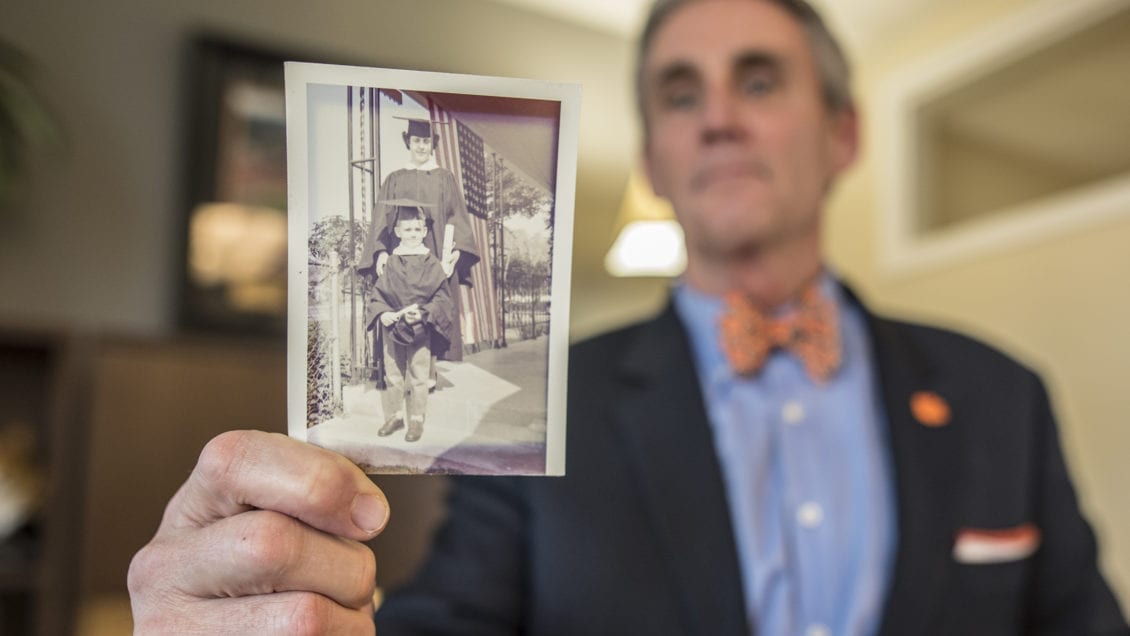George Petersen remembers escaping; his mom, Mabel, scooping him out of bed in the middle of the night when he was 4 years old, secreting him out of a dark house and into the frayed back seat of her pale blue Ford Fairlane and pulling away into a restless Los Angeles night.
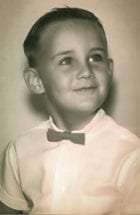
It was the turbulent 1960s in Southern California. There weren’t many places for an unescorted woman with children to go, but any place was better than the house they were leaving behind. Tonight, they would stay with relatives in Ventura. Tomorrow, it might be a cheap motel room with a hole kicked through the door. Sometimes they just slept in the car.
They ran like this for weeks at a time over many years, destitute and on the move, hiding out from place to place like criminals, but it wasn’t the law they were evading.
Petersen doesn’t mince words when describing his father: “He was vicious and violent and he took it out on my mom and me. Much of my childhood was spent avoiding him.”
Moving from town to town, room to room, in and out of schools until he was 12: It’s a long way from his life today, where he is firmly rooted as founding dean of Clemson University’s College of Education. He’s not running or hiding any more, having built a national reputation by continually investing in the one thing that saved him and his family: education.
‘Little girl abandoned’
Petersen now sits at the helm of a college at one of the premier institutions of learning in the nation, but his life could easily have followed a dark path if not for the cleverness and tenacity of his mother.
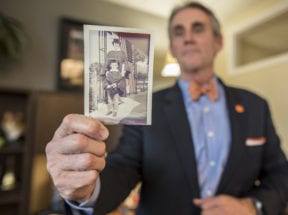
Mabel Petersen grew up during the Great Depression in a life torn straight from the pages of “The Grapes of Wrath.” Resiliency and a strong faith in God became life-saving necessities to her from a very young age. At 5-foot-3 fully grown, she was the smallest in a family of migrant workers that traveled from town to town following the crops. They had no home and zero stability, which translated into an extremely volatile life.
“She came from worse than nothing, with no support and zero advantages save her intelligence and determination,” said Laura Petersen, the youngest of George’s two sisters. “She was surrounded by misogynistic and debasing people at every turn; including family members. She was a constant outcast and object of ridicule. A little girl abandoned.”
A sad tone slips into his voice as Petersen describes how his mother would find work wherever she could to support his two sisters and him — as a hotel maid, as a babysitter, in a bakery — surviving a seemingly endless uphill battle. There never was any money.
“There were long periods of time where I’d be out of school and we’d live in the car or in a motel or with church friends,” said Petersen. “She was divorced with three kids and didn’t even have a GED. Finally, she realized that if she didn’t do something, it would never stop and we’d just keep spinning around the drain.”
The solution was simple in the end. She decided to go back to school.
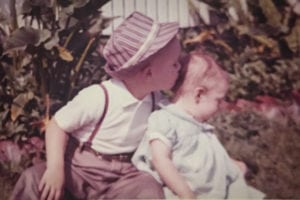
When George was 8, she started taking night classes at California State Polytechnic University-Pomona. By the time he was 12, she’d earned a Bachelor of Science while working her fingers to the bone during the day and studying at night.
With her degree in hand, she bought a house and became an elementary school teacher. By 1969, she finally had the life she wanted for her kids.
Mabel Petersen’s decision to get an education changed the course of her family’s life, but the ripple effects have spread much farther than that. Her legacy has impacted generations of students all over the world through the little boy in the back seat of that car who would grow up to be one of the finest educators in the nation, but he would need a little divine intervention of his own first.
A second stage
“When my mom got her teaching credential, she got a job in Ventura, a little beach town,” recalled Petersen. “After that we didn’t need coupons to shop, we had clean clothes every day and we stayed in one place. She had straightened our life out.”
The newfound stability was a blessing, but the tumult of his childhood had left deep marks, which manifested themselves in ugly ways as he grew into a young adult.
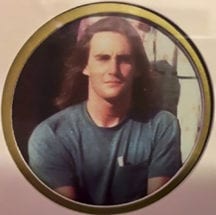
“My mom pivoted at the right time and got us stable, but I was 12, so I needed a second stage to straighten out,” he said. “I was pretty angry in high school. During my junior year I said, ‘I’m done.’ I stopped caring about school. As soon as I graduated I moved to Fresno and started hanging drywall, thinking I was going to be famous somehow. My mom was not pleased.”
Trouble was easy to find. He fell in with some other wayward souls and before long was doing “bad things all over Fresno.” He doesn’t go into detail, except to say that it was some seriously stupid stuff.
He can laugh about it now. “I was doing things that could have put me in orange, and not Clemson orange.”
His wakeup call came when two of his friends were arrested and sent to jail for 10 to 15 years. The shock of it sent him searching for a better way to live his life. One day he found himself in a Ventura doughnut shop, where he met a stranger who would become the second person to steer him toward a better path, a priest named Tom Warren.
He took a chance and approached the man in the collar sipping coffee and writing a parish newsletter.
“You’re a Catholic priest, right? If I talk to you, you can’t rat me out, right?” Petersen blurted.
The priest gave the scruffy young man a quick look-over.
“I guess you’re talking about a confession,” he said and agreed to listen to whatever Petersen wanted to say.
When Petersen was finished pouring himself out, Warren gave him an ultimatum:
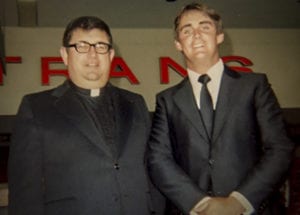
“You’re in a lot of trouble and a lot of folks are looking for you. I can help you, but you have to do exactly what I say.”
Petersen agreed, and that chance meeting turned into a life-altering encounter. The kindly priest took him under his wing and he converted to Catholicism.
“Because of him, I got squared away and did my undergraduate in philosophy in Rome,” Petersen said, adding with a laugh: “He even got me thinking about being a priest, but the obedience thing didn’t work for me.”
In 1981, he graduated cum laude from the Pontifical University of St. Thomas Aquinas in Rome with a bachelor’s degree in philosophy.
The whole family was immensely proud of how her brother turned his life around, said Laura.
Even Petersen’s grandfather, a hard-shell Baptist, was amazed by what the church did for his grandson.
“He said, ‘If the Catholic church can turn George, it must be the right one,’” Petersen laughed. “He became a Catholic on his death bed.”
Ripple effect
Petersen returned from Rome feeling higher on life than he ever had. That positivity served him well when he spotted a beautiful woman walking across the campus of Ventura Community College. He boldly approached her and was unceremoniously rejected. Undeterred, he tried again and again until she finally agreed to go on one date. That’s all he needed.
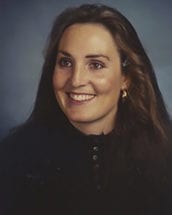
“He had me laughing so hard that I spit food out at him,” said Jennifer Petersen. “Yet rather than feeling mortified, he made me feel at ease.”
They married six months after that first date.
Jennifer was the last piece of the puzzle: he was whole. Now that he had the perfect partner; he could do anything with his life.
“Without her, I wouldn’t have been able to go the distance,” he said. “She is the saint in this equation.”
With his wife’s support, he decided to follow his mother into teaching. He marveled at how getting an education had transformed their lives and was compelled to give as many others as he could that same opportunity.
His undergraduate degree landed him a job as a high school social studies teacher at San Benito High School in Hollister, California – Steinbeck country. The work filled him with purpose, as he would often come across young people who needed direction in their lives and he could relate to that.
John Hardin, who now is a Hollywood producer of music videos with superstars from Rihanna to Miley Cyrus and of commercials for many national brands, met Petersen when he was drifting through his senior year at San Benito.
“I was not that interested in school,” Hardin said. “I was interested in film, music; basically anything but what we were being taught, but through that, George was able to connect. I learned more than I thought I would. Not only what he was there to teach, but how to grow up. How to look at the world through better eyes. He related to the students in a human way, which, in turn, made us take note of what he was saying.”
Hardin remembers a banner Petersen hung in his classroom: “You Are The Master of Your Own Destiny.”
“He meant it,” said Hardin. “Although he related to the students, it didn’t mean he was soft. If you want an A, earn it. If you’re OK with an F, you can earn that too, but it’s up to you.”
Actor and producer Kirk Ward also crossed paths with Petersen at a crucial time in his life.
“I was 17 years old and headed into my senior year. I was the youngest of five. We were raised without a father and suddenly I was at the top of the food chain both at home and at school and had no idea what to do, what to expect or even who I was. I was terrified,” Ward said.
One day Petersen stepped in as another boy was challenging Ward to a fight and told Ward to meet him in his classroom after school.
“He gave me this lecture about being a champ and how people always want to knock out the champ and how ‘real champs don’t fight chumps,’” said Ward. “As this monologue flowed, he impersonated Clint Eastwood to punctuate certain points. I found myself hanging on every word, at ease and comfortable, while thinking, ‘This guy is a teacher?’”
Petersen, who was also a boxer, took Ward under his wing and taught him discipline through pugilism.
“It was amazing. I had a father figure that was patient and kind, tough and challenging, charismatic and respectful. He made me want to learn. I still have a heavy bag in my garage. I am the ‘fighter’ I am today because of George Petersen. I kicked drugs and alcohol 20 years ago because I learned how to fight. I’ve survived Hollywood because I learned how to fight. He helped me see who I was and to take pride in who I am, and I will pass along the strength he gave me to my children and to those who I teach by simply being me, because that’s what I learned from Mr. George Petersen.”
Hardin and Ward were just two of hundreds of young people Petersen profoundly impacted during his time as a high school teacher.
In 1987, he received the Sallie May Outstanding Teacher award, recognizing him as one of the top 100 teachers in the United States.
He’d reached the pinnacle of teaching secondary education, so he set his sights on college academics, hoping to acquire an even larger footprint. He earned a master’s degree in educational policy, organizations and leadership from the University of California Santa Barbara in 1991, and, in 1993, his mother watched as he received his doctorate as the valedictorian.
Petersen spent 25 years carving out a distinguished career in higher education at universities all over the Unites States, including the University of California Santa Barbara, Bowling Green State University and the University of Missouri-Columbia.
In 2014, he was offered the job of founding dean of Clemson University’s College of Education.
Underdogs

“Being a dean was not something I’d ever considered,” he said. “But when I began to do research and have that broader impact as a scholar and a teacher, I realized there were people citing my work who had never met me. My research was influencing how they think about leadership and organizational learning. I came to an understanding that a really good dean, somebody who is really engaged, can provide opportunities for their faculty to make that kind of impact.”
When the offer came from Clemson, which lies in an area with some of the lowest-ranking K-12 school systems in the country, he saw an opportunity to improve the lives of thousands of children who might just need a caring hand like those that saved him.
“There’s nothing more transformational than education,” Petersen said. “So part of what I’m trying to do is to get our faculty to think about themselves in the bigger picture. We at Clemson have a responsibility to serve the underserved because we are obligated by our charter to go above and beyond just doing research and teaching. We have a moral imperative to improve education across the state.”
His vision is to build a lifeline to South Carolina’s struggling school systems using Clemson’s rich repository of world-class educators and soon-to-be educators. The chain will reach from him to his professors, to the students and ultimately to their students as they become teachers, counselors and leaders, ideally in the schools they become involved with through innovative programs like Call Me Mister and a groundbreaking teacher residency program. He also introduced a new doctor of education program aimed at creating leaders with the motivation and skill sets to fix struggling schools.
All of this was done in his first three years as dean, with much more to come.
“We have to create a level of urgency,” he explained. “We don’t have the luxury to just screw around for five years. That’s five more senior classes of kids who won’t be ready for college, five more classes of fifth-graders who won’t be STEM-ready, five more classes of third-graders who can’t read at grade level. You’re just condemning those kids if nothing’s done.”
He sees a lot of himself in those kids, which is why his heart is so fully invested in helping them.
“Some of those kids are going through the same things I was, with no capacity to make a change,” he said. “Education is the pivot point for everybody, but you can’t make bread if you don’t have flour, so we’re going to bring them flour.”
Petersen is thrilled with the progress that’s already been made and credits his colleagues at Clemson for making it all possible.
“My ability to work with such smart and engaged people who understand where I’m trying to go and are willing to work with me – that facilitates all this stuff,” he said, adding with a wink: “In short, surround yourself with really smart folks and your job gets a lot easier.”
Another thing that surrounds him, constantly, are the reverberations of his mother’s love. A photo of the two of them sits on his desk, turned outward so everyone that enters his office can see who put him there.
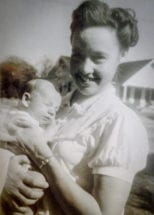
Mabel Petersen passed away in 1994 from non-Hodgkin’s lymphoma, Petersen believes as a direct result of the chemicals she ingested in her youth working the fields. Thankfully, she got to see all three of her children graduate from college. The ripples continued through all eight of her grandchildren, who are college graduates as well.
“There are a lot of people whose shoulders I stood on to get here, primarily a little gal from Missouri who had a backbone of titanium and made sure we all got an education,” he said.
“Our mom was our hero,” added Laura. “A scrappy, clever, tenacious, selfless little migrant girl, who became the bedrock of not just our lives, but who touched so many others. Her story proves that love, prayer, faith, perseverance, hard work, a willingness to do whatever it takes – plus, a little help from others – can transform a life. And that model can translate into generations of others, who in turn carry the torch to future generations.”
Petersen fills with pride knowing that that torch is burning brighter and touching more people than ever at Clemson, and he says there’s a good reason for that.
“My thinking about it is; this is an institution that is designed to help the underdog make it,” he grins. “That might be why I feel at home here.”

